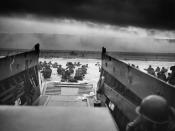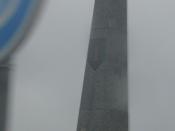The 1st infantry division, known as The Big Red One had a very difficult job. Not only was it very physical but a very stressful mental job in the European Theatre in World War II. The 1st infantry unit had their own little battle to fight, survival. As Sap said at the end of the movie, "Survivors"æ. Only glory in war"æif you know what I mean."àThis is also one of the themes the film writer, Samuel Fuller, was trying to convey to the audience. Another theme is that the axis and ally soldiers are both human beings but in war they are portrayed as animals in the fact that they are easily expended with out much question. Another good example of what I believe Samuel Fuller is trying to portray is the fact that the 1st infantry division is used in the same way that pawns are played in the game of chess in which there are many examples to support this throughout the movie.
In general I believe the theme Samuel Fuller is trying to convey to his audiences is that the 1st infantry riffle man soldier was the first to attack, the first to secure enemy lines, the first to die, while trying to survive the game.
The soldiers of the 1st infantry riffle men were young and had many hopes and dreams, and yet were shown more fear and evil than most men will ever possibly feel. These men who were in the 1st infantry division were the first line of defense. They moved into enemy territory and secured it. They did most of the fighting and most of the dying. The men in the movie, Griff, Vinch, Sap, and Johnson, did not want to get to know the names nor the faces of the replacements that were sent in place of those men who lost their lives in their group. The reason for this is that they all knew that it would only be a small time before the replacements were killed and new men would take their place once again. It would be gravely destructing to their minds and hearts if they had bonded to the replacements just to turn around to see they've been killed. They felt they needed to distance themselves from them in order to keep themselves as sane as they could in mist of the war.
At one point in the movie one of the men, I believe it was Griff, told the sergeant that they had just murdered those German soldiers and the Sergeant replied, " It is not murder when you kill an animal is it? You kill it."ÃÂ The very next scene is of a German soldier that is telling his commander that he will not murder any more people. His sergeant said the same thing, "It is not murder, this is called killing the enemy just like killing an animal."ÃÂ These two statements from both sides of the war leads one to believe that the soldiers were thought of as animals and not human beings with a name, a face, and a heart. This shows that the 1st infantry riffle men on the U.S. side of the war were nothing but easy expenditure. They were something to face of the enemy with so that the rest of our military out fit can move in with little loss.
Another way the American combat soldier is portrayed in this movie is that they were uses as pawns just as a pawn is used in the game of chess. It does not matter if you loose a pawn as long as your more powerful, larger, and stronger ones are safe. You don't want to loose them right off the bat in the beginning of a battle. I believe that is the way the men in the Big Red One felt also. One reason I feel this way is that in the movie the 1st infantry checks villages for the enemy by means of what is called an Egg Patrol. This is where the men and the Sergeant form a line and send one man, the designated lead man, out in the open to see if he gets fired upon. If he does this means there are enemy soldiers there and if not they are in the clear but still have to be alert because the enemy may be hiding still. This also proves my point that these combat soldiers are used as pawns.
The main theme of this movie is shown in two parts in which the first shown in the beginning scene. This is where a U.S. combat soldier in World War I is on his way back to his post and comes across an enemy soldier. He kills the soldier with a knife and proceeds on his way to the post. He tells his commander he killed the enemy and his sergeant replies to him that the war had been over for nearly 4 hours. This soldier feels sorrowful in that at the time he killed the man they were not enemies anymore, simply strangers to one another. The second part is in the end of the movie during WWII where Sergeant Russel with the 1st infantry division, or the Big Red One, stabs a German soldier. Some men in his group hear the commotion and run to find him with the German. They tell the Sergeant that the war has been over for an hour. With this news the Sergeant feels sadness sweep over him along with happiness and he replies to the German, "You're gonna live! Your gonna live if I have to blow your brains out!"ÃÂ These two instances prove that the men do not want to kill these enemy soldiers but will do so in a state of war. They would rather be at peace and be simply strangers who pass each other by rather than knowing that if the opposite weren't killed you would be. Survival was the game and these four men and their Sergeant lived it.
Another important display of the ill effects of war not only on the soldiers but the civilians as well were included in the film. One example is the woman who was pregnant and was having her baby inside of a tank with the help from the 1st infantry soldiers. She was saying, "No! No! Not here. Not like this."ÃÂ I believe she meant that she didn't want her baby born in the middle of the war and certainly would have rather her child born in a hospital, not a tank. During her screams of pain a German Soldier out side hiding behind a cross begun to cry. He no longer wanted to fight and turned and walked away. I believe this saddened him in a way that made him feel that neither the time nor the place was right for a child to be born. Later in the movie Sergeant Russel found a child whom fell ill due the effects of war. At first the Sergeant only wanted to give him some food to hold the child over, not wanting to become to close to the child for fear he would too fall victim to the evil results of war. The more the Sergeant looked at the boy, I believe he knew that the child was at no fault. I also believe the Sergeant really wanted a small piece of happiness and satisfaction in that if he could care for and help this child a little that would mean so much more sense than all the death and war he had become witness to. So the Sergeant found a little music box and gave it to the boy to listen to and hopefully find some sort of peace in the enchanted melody that played. He then shared a picnic with the boy, picked him up on his shoulders and walked along the river with the boy. Soon the boy fell to his side and passed away. This hurt the Sergeant deeply and also showed the audience of the movie that the effects of war present everyone with the same outcome of disaster. This death proves that war has no sympathy and while it may hold one soul source as its' cause, it's effects run far more deeper than that.
I truly enjoyed this film. I can now say I had a small privilege, yet it's lessons greater in depth, to see what the 1st Infantry Division of Riffle Men known as The Big Red One went thru in World War II. This film I feel portrayed these men rightfully and honestly. As watching this movie I had wished there was some way that we could have saved these men from the torment, fear, and sadness they went through. Unfortunately the past has been set and the history books have been marked. I feel in the least that these men deserve more gratitude, more honor, more respect and more love than they probably will ever receive.



